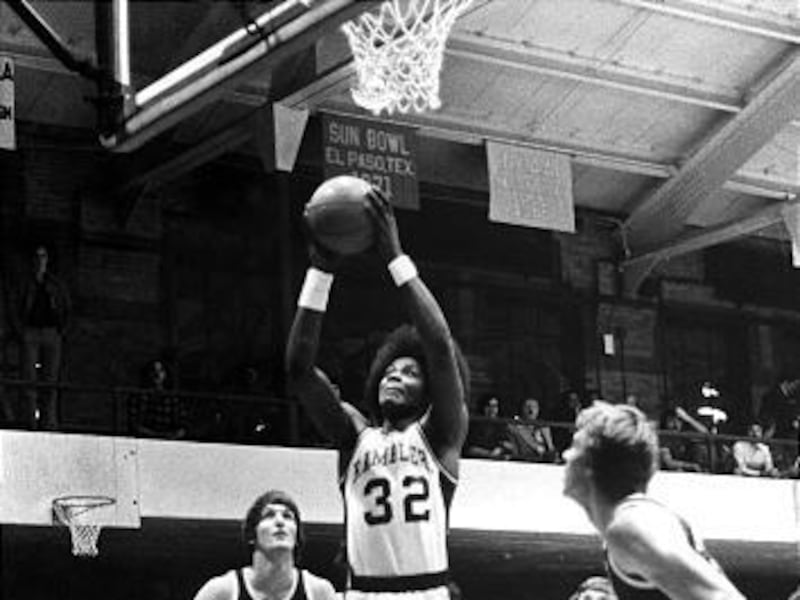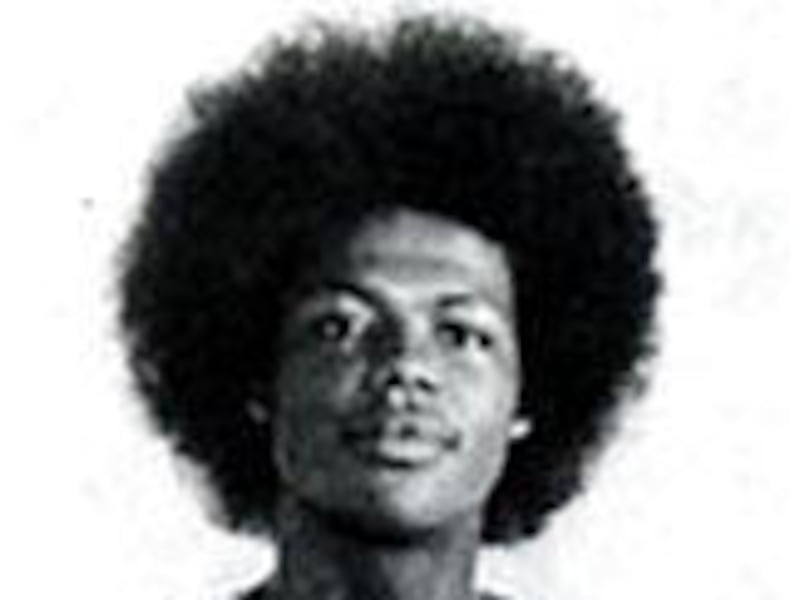The year was 1979, and it was the last in which the Jazz — who'll do the same Thursday night — selected 20th overall in the NBA Draft.
That's perhaps a good thing, too, based on how things went then.
Larry Knight, after all, never did play in the NBA.
Not one regular-season game. Not one quarter. Not even a minute.
In fact, he never made it past the preseason.
"He was a nice kid," said Tom Nissalke, who at the time had just been hired to replace Elgin Baylor as head coach of the Jazz.
"He was a so-called defensive specialist, which, translated, meant he couldn't score, I mean, he couldn't shoot the ball at all. It was just a bad pick."
Frank Layden, the Jazz's newly hired general manager that season, made it 30 years ago this Thursday.
And for good reason, Layden suggested: The forward from the Loyola University Chicago was a rebounding machine in college.
"A very nice college player," said Chicago attorney and former NBA agent George Andrews, who watched Knight play at Loyola. "He was a physical guy, a power forward, a double-double guy and didn't get a lot of attention in Chicago his senior year because that was the year Mark Aguirre was a freshman at DePaul.
"He (Knight) was more of a rebounder than a scorer," added Andrews, whose client list included Magic Johnson, Isiah Thomas and former Jazz point guard Rickey Green. "He was physical, but not very athletic."
In December, Knight was one of 11 honored at Loyola for being named to its 1970s All-Decade Team.
As a senior at Loyola he pulled down a whopping 14.3 rebounds per game.
Knight — who couldn't be reached for this story, and who couldn't even be located by Loyola officials for the All-Decade celebration — also averaged 21.5 points in that final season for the Ramblers, which ended with a 37-point, 23-board effort in a win over DePaul.
"Good kid. I thought his credentials were good," Layden said. "He was a terrific college rebounder."
The Jazz were without their own No. 1 overall selection at the time, because it had been shipped to Los Angeles as part of a 1976 compensation package for the signing of Gail Goodrich — allowing the Lakers to land Johnson.
But they did have the No. 20 choice, acquired the previous January as part of a trade that sent forward Truck Robinson to Phoenix.
Using it on Knight was a seemingly sensible call for Layden — even though the next two picks were used, respectively, by New York on Sly Williams, who played 305 NBA games, and by Phoenix on Kyle Macy, who would log 551.
"He (Knight) was a hard worker, a real good college player and a real banger," Layden said.
"But he couldn't cut it with us."
And that, frankly, surprised the retired Jazz coach.
"I mean, anybody could have played on our team then. Our team stunk," Layden said. "I tell people that's why we came to Salt Lake (from New Orleans in 1979). It's because we had a bad team."
The Jazz went 24-58 that season.
They had hall-of-famer Adrian Dantley and ABA star/current Jazz TV analyst Ron Boone and even, for 17 games, the late, great Pistol Pete Maravich.
Second-round pick Tico Brown of Georgia Tech didn't make the team either in '79, but fourth-rounder Greg Deane of the University of Utah (he played seven games) did.
The Jazz utilized 20 different players that season, including as well rookie Paul Dawkins of Northern Illinois, one of only two selections from the '79 draft's 10th round to actually appear in an NBA game.
Dawkins would play 57 games in his one and one NBA season, including one vs. Portland in which he scored 30 points.
"Now if Larry Knight could have shot the ball the way Paul Dawkins could. ..." Nissakle said. "Offensively, he (Knight) was so inept."
Layden, who had been hired as GM only about a month-and-a-half before the draft, said he did see Knight play prior to making the pick.
But scouting practices then were nothing like now.
No library of tapes on every prospect in the draft, no bundles of cash spent bringing in kids from far and wide or flying to games from coast-to-coast and even overseas.
"I'd like to be able to say we spent the money, but we didn't," Nissalke said. "As far as I remember, I never saw (Knight) in a game."
Layden recalls that the Jazz also had some contract-related issues with Knight's agent, and Nissalke remembers delivering the news that he'd been cut.
"I just said, 'You're not gonna make the team," Nissalke said.
Knight's reaction? "No reaction," Nissalke said.
Then there was the matter of informing the public, and a community in a new home following the Jazz's move Utah, that the club had waived its first-round pick 11 days before it season-opener.
Surely, there was tumult in Jazzland ... Sports-talk radio know-it-alls babbling in disbelief, crazy columnists questioning the sanity of it all, rabid message-board posters calling for Layden's and Nissalke's heads ... Right? Uh, no.
"I never heard a word," Nissalke said. "I would say nobody cared.
"The coverage at the time, it was so University of Utah-slanted. There wasn't a lot of interest (in the Jazz), really, at all. There might have been something in the papers or on TV, but certainly nothing from the standpoint of, 'Geez, how could you do this?' Nothing like there would be now."
But what was done then was done. And now, three decades later, there's no looking back.
"It wasn't a great pick. ... But we were shooting craps in those days," Layden said. "I don't worry about those things. I think once you make the decision, that's your pick."
e-mail: tbuckley@desnews.com


